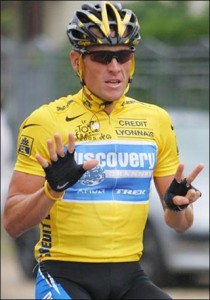Lance Armstrong and doping charges
Declaring “enough is enough,” Lance Armstrong says he will not fight charges brought by the U.S. Anti-Doping Agency, a stunning decision that will cause him to be stripped of the seven Tour de France titles that turned him into an American hero.
USADA confirmed late Thursday it will strip him of all results since August 1, 1998 and ban him from all competition for life. Armstrong said his decision did not mean he would accept USADA’s sanctions. His lawyers threatened a lawsuit if USADA proceeded, arguing the agency must first resolve a dispute with the International Cycling Union over whether the case should be pursued.
“It is a sad day for all of us who love sport and our athletic heroes” – USADA CEO Travis Tygart said. “This is a heartbreaking example of how the win-at-all-costs culture of sport, if left unchecked, will overtake fair, safe and honest competition.”
Lance Armstrong effectively surrendered his seven Tour de France titles Thursday, announcing he was giving up his years-long fight against accusations that he cheated to repeatedly win cycling’s greatest race.
U.S. Anti-Doping Agency Chief Executive Travis Tygart said late Thursday he was still waiting to hear directly from Armstrong but added that the cyclist’s decision not to proceed in an arbitration process will leave Armstrong stripped of all of his Tour titles and 2000 Olympic bronze medal and result in a lifetime competition ban.
“There comes a point in every man’s life when he has to say: ‘Enough is enough’” – Armstrong (40) wrote in a statement emailed to The Times and other news agencies.
“For me, that time is now. I have been dealing with claims that I cheated and had an unfair advantage in winning my seven Tours since 1999.”
Armstrong’s attorneys asked a USADA attorney to turn the matter over to UCI, the international cycling union, but USADA maintains it retains jurisdiction to strip the titles.
Armstrong never tested positive for performance-enhancing use during his decade-plus of Tour races.
If the USADA strips Armstrong of his titles he would become one of the highest-profile athletes to face such a sanction, at least since Canadian sprinter Ben Johnson was disqualified from the 1988 Seoul Olympics after winning the gold medal in the 100m race.
Texas-born Armstrong, who retired from professional cycling last year but remains the face of his anti-cancer charity, Livestrong, has long denied that he used performance enhancing drugs to help fuel his brilliant career.
He maintained that emphatic denial in the statement issued on Thursday, stressing that there was no physical evidence to support what he called Tygart’s “outlandish and heinous claims.”
Armstrong, who never failed a doping test, said he would “jump at the chance” to put the allegations to rest once and for all, but refused to participate in the USADA process, which he called “one-sided and unfair.”
He disputed the agency’s authority to take away his titles.
“Today I will turn the page” – he said. “I will no longer address this issue regardless of the circumstances.”
A spokesman for the World Anti-Doping Agency, based in Montreal, could not immediately be reached for comment on Thursday night.
Armstrong (40) has been one of the most successful and controversial cyclists of all time, returning to the sport after beating cancer to win the Tour de France an unprecedented seven times in succession from 1999 to 2005.
Livestrong (known for its popular yellow bracelets) takes its inspiration from his achievements and recovery from testicular cancer.
The USADA, a quasi-governmental agency created by the U.S. Congress in 2000, formally charged Armstrong in June with doping and taking part in a conspiracy with members of his championship teams. Five other cyclists have been accused of conspiring with Armstrong over the course of 14 years to hide doping activity.
The agency said in a letter to Armstrong that it has blood samples from 2009 and 2010 that are “fully consistent” with doping.
